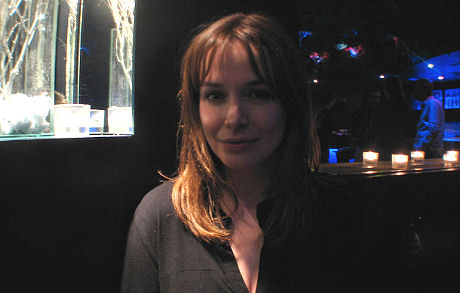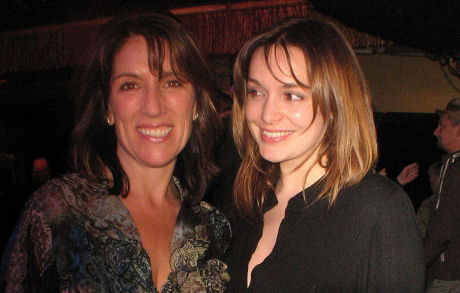Regarding the ongoing discussion about CG-enhanced performances (i.e., Jennifer Connelly and Jeff Okun‘s CGI tear in Blood Diamond) , reader Jack Price has passed along this www.lookeffects.com reel. He suggests paying attention to the third-to-last shot, before Passion of the Christ and Southland Tales.
Day: March 18, 2007
Leydon’s “Shopgirl” wrongo
Moving Picture Blog’s Joe Leydon is weirding out on us — he’s recommending readers to watch a Monday evening Starz cable network showing of “the criminally under-rated” Shopgirl …good God!
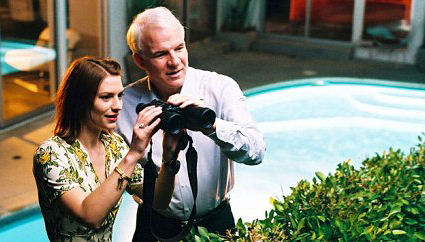
“Steve Martin the author is well served by Steve Martin the multihyphenate in this delicately nuanced 2005 dramedy,” Leydon writes…bullshit! And that goes double for Leydon’s claim that it’s “a smartly reconstituted yet surpris- ingly faithful adaptation” of Martin’s novella.
I could rephrase what I wrote about Shopgirl during the 2005 Toronto Film Festival , but it’s easier to just paste it:
“Shopgirl is said to be based on Steve Martin’s dry, somewhat downbeat novella of the same name. It’s not, actually.
“Someone at Disney said, ‘We can’t really do Steve’s book…we have to settle for taking the basic story line and then broadening it out and adding extra moods and colors and beefing up the Jason Schwartzman character so we can get the kids to come see it.”
“And then the director, Anand Tucker, decided to add syrupy violin music and splashes of artsy-fartsy digital photography here and there, and the end result is simultaneously too much and not enough. It seems overly fussed with, as if portions of it were re-shot and re-edited. A lot of it feels awkwardly stitched together and tonally lumpy.
“If everyone had said, ‘Let’s make a little movie that’s really based on Steve’s book for next to nothing and worry about pocketing the big paychecks on the next job,’ it might have worked…maybe.
“It’s basically the story of Mirabelle (Claire Danes), a would-be artist who’s slowly dying of boredom selling gloves at the Beverly Hills branch of Saks Fifth Avenue (i.e., the one in which Winona Ryder was busted for shoplifting). For what it’s worth, Danes gives the film’s best performance by far…but then she’s always good.
“The movie spends 15 or 20 minutes setting up her relationship with a poor amplifier technician named Jeremy (Schwartzman) before Ray Porter (Martin) comes into the store and sweeps Mirabelle off her feet with some genteel moves that include lavishing her with nice gifts and paying off her college loan.
“You know Danes isn’t going to last with Martin and will end up with Schwartzman, etc., but I wasn’t prepared for the depressing fact that Martin is looking older and puffier than I’d prefer. I don’t know if it’s cosmetic surgery or whatever, but he should try and go back to looking precisely the way he did when he made All of Me, or at least The Spanish Prisoner.
“And it’s understandable that Martin’s Ray Porter doesn’t say any sharp zingy lines because he’s this slightly dull guy from Seattle, but it would have been cool regardless if he had been written as a Steve Martin-ish wise-ass.”
Scott on New Movie Choices
“It has become something of a truism that web culture is driven not by traditional, top-down forms of tastemaking like the judgments of professional critics or the strategies of corporate marketers, but rather by the lateral operations of social networks,” observes N.Y. Times critic A.O. Scott in a piece called “The Shape of Cinema, Transformed at the Click of a Mouse.”
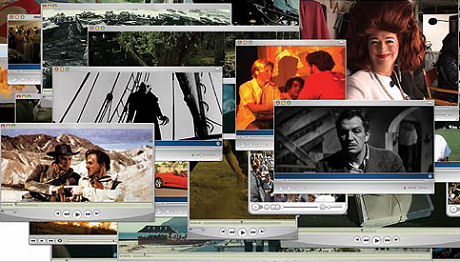
“Niches and coteries form organically, as like-minded people bond in cyberspace over shared enthusiasms. And this, in turn, encourages a do-it-yourself approach to production and distribution [of movies]. Just as a band, at least in principle, no longer needs a record label to be heard, so can a filmmaker forego the meddlesome mediation of a studio. Shoot your picture in your living room with your friends, edit it on your laptop, and I√ɬ¢√¢‚Äö¬¨√¢‚Äû¬¢ll watch it on mine, in my living room, with my friends.
“Or something like that. Surely there can never be too many movies. Or, to put it another way, there will always be too many movies, more than anyone can keep track of. That more will be made, and that more will have a chance to be seen, is hardly cause for complaint. But by now we should have learned to regard utopian — or apocalyptic — predictions about the impact of the internet with a measure of skepticism. The technology has yet to be developed that can increase the number of hours in the day, which means that, somehow, we will still need to choose among the thousands of movies at our instantaneous disposal.
“What will guide those choices? Will the social networks that drive taste on the web discover new and neglected works? Will they manage to circumvent both relentless marketing and criticial myopia? If the short history of the internet teaches anything, it√ɬ¢√¢‚Äö¬¨√¢‚Äû¬¢s that any decisive, early answer is sure to be wrong.”
Brown has it
When an actress has it, there’s no missing it. A certain spark, a special spritz …something extra that sticks to the wall. This doesn’t mean she’s absolutely destined for stardom or worldwide fame or even steady employment (life being more indifferent and unfair than not), but I feel compelled to say this clearly and plainly, not because I’m a talent scout but because I know what I know: Lucy Brown, a 27 year-old London actress who performed at last Monday’s WordTheatre presentation, has it.
By this I mean poise and passion and a robust emotional current in her voice. She has one of those nicely cultivated but not-too-rarified British accents, and a fair amount of lung power behind it. Plus she’s dishy-creamy with big brown eyes and a sort-of earthy, unforced erotica that would seem exactly right if she were a nun and wearing a habit. That’s an odd way of putting it, I realize, but if someone were to remake Heaven Knows, Mr. Allison, she’d be a cinch for the Deborah Kerr part.
I’ve got her pegged as a British Rachel McAdams (who started to get famous at roughly the same age) with a little Saffron Burrows and some mid ’60s Julie Christie thrown in.
And yet Brown has done nothing so far but British TV roles (the popular sci-fi/ dinosaur series Primeval, Minotaur, Whatever Love Means) and has never been to Los Angeles — literally. Her London agent is ICM’s Fiona Mcloughlin, but when you call ICM’s Los Angeles office and ask for her local rep, you’re told she has none.
The first wake-up happened before the WordTheatre event began. I was sharing my reactions to Peter Morgan‘s screenplay of Frost/Nixon, which Ron Howard is going to direct later this year, with Brown, Ian Hart and another guy, and I said at one point that it didn’t find it terribly emotional. “Oh, but it is…it is that at the end,” Brown replied. I like people who convey impressions with absolute certainty.
Then came Brown’s WordTheatre reading of Rose Tremain‘s “21st Century Juliet.” The verdict around the room after the show ended was that Brown’s reading was the best (certainly the spunkiest), closely followed by Ray Panthaki‘s reading of Gautam Malkani‘s ‘Paki.”
Tremain’s story is about a young woman of some breeding and opportunity (she’s 30, works in p.r.) being sexually in love with a Moldavian builder named Romeo (pronounced “Roh-may-o”) but knowing, as always, that it would be smarter to marry some rich guy whom she likes but isn’t all that hot for. (We all know how these stories turn out.)
Richard Smith, a correspondent for a British short-story website who also attended, said that Brown read her piece “in a cut-glass accent that should have smashed the mirrors to smithereens.”
Nothing more to say about Brown except for a slightly sexist comment (either you admit to them or you don’t.) And it’s that some of us are a bit more attracted to exceptionally pretty women who don’t seem to have an immaculately sculpted, anorexia-nervosa model-thin body — women who have all the luscious attributes but seem more everyday natural and “one of us.” There’s something almost Triumph of the Will-ish about women who have trained too ferociously, and I suppose that Brown’s hot-nun thing feeds into this.
Sorry if this sounds “wrong”, but guys are always processing actresses in terms of their 1 to 10 allure, and Brown’s is somewhat different and quite potent for that.
WordTheatre in London
Last Monday night at London’s Cafe de Paris I attended one of Cedering Fox‘s WordTheatre gatherings — a literary salon-type deal in which a blend of modestly famous and very famous actors (West Wing star Richard Schiff and British actor Ian Hart were the headliners) stand in front of a mike and read short stories to 150 or 200 people, with those in attendance getting to feel slightly special as a result.
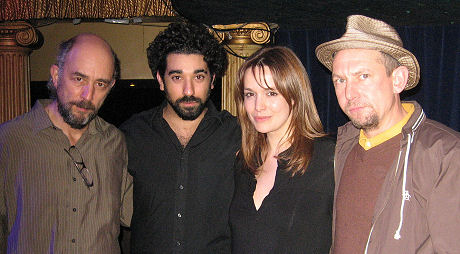
(l. to r.) Richard Schiff, Ray Panthaki, Lucy Brown, Ian Hart at last Monday evening’s WordTheatre performance at London’s Cafe de Paris
Actors are always best when savored live; they rarely get to show their range and strut their best stuff in movies. And because the stories are carefully chosen and the readings aren’t just “read” but performed with exceptional flair and expertise, a WordTheatre event — I’ve been to two — delivers the same kind of nutritious turn-on vibe that a first-rate play usually provides. Plus there are glasses of wines and trays of canapes (i.e., munchies that are somewhat lighter and crispier and less filling than hors d’oeuvres) passed around before and after the show.
WordTheatre presentations happen year-round in London (where three are yet to come in ’07), New York and Los Angeles. Last Monday’s show featured Lucy Brown (see below) and Ray Panthaki along with Schiff and Hart.
A big London supporter is Guardian contributor and fiction editor of Prospect magazine Alex Linklater, his hope being that WordTheatre will help revive general interest in the short story and particularly in the National Short Story Prize. In remarks before the Cafe de Paris show began, Linklater said that “some time in the 1980s something went wrong with our relationship with the story form. Up until then they were everywhere, ranging from Jackanory and Roald Dahl to Ian McEwan and Angela Carter. Then suddenly publishers and editors decided people didn’t like them.”
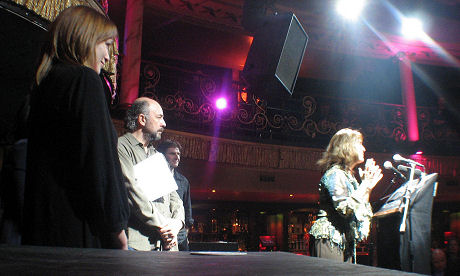
WordTheatre founder Cedering Fox (far right, at mike) delivering closing remarks; Brown and Sciff to the left.
Hart read Adam Marek‘s “Testicular Cancer vs The Behemoth,” Brown read Rose Tremain‘s “21st-Century Juliet,” Ray Panthaki read from Gautam Malkani’s “Paki” and Richard Schiff (best known for playing White House operator Toby Ziegler in Aaron Sorkin’s The West Wing) read Michael Faber‘s “Vanilla Bright Like Eminem.”

